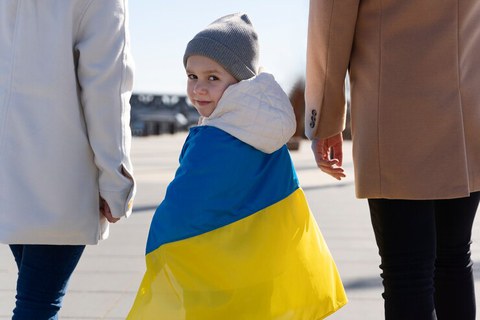Interpersonal Psychotherapy for Ukrainian Children, Adolescents and their Families (IPT-KJU)
Study director:
Prof. Dr. Anna-Lena Zietlow, Chair of Clinical Child and Adolescent Psychology, TU Dresden.
Prof. Dr. Eva-Lotta Brakemeier, Head of the Chair of Clinical Psychology and Psychotherapy, University of Greifswald
In cooperation with:
University Outpatient Clinic and Research Center for Psychotherapy (UFP) of the TU Dresden gGmbH.
Center for Psychological Psychotherapy (ZPP) Greifswald
Contact persons in Dresden:
Study director: Prof. Dr. Anna-Lena Zietlow: anna-lena.zietlow@tu-dresden.de
Study coordination: Dr. Judith Buse
Objectives:
Within the project, Ukrainian children, adolescents between 8-17 years of age and their families, who are seeking protection in Germany and need psychotherapeutic help, will be treated with Interpersonal Psychotherapy (IPT). The aim of the study is to adapt the family-based IPT (FB-IPT) as well as IPT for adolescents (IPT-A) to the specific situation of Ukrainian underage protection seekers, to implement it and to evaluate its effectiveness. In this context, the therapists are also continuously trained. Overall, the project aims to improve psychotherapeutic care for Ukrainian children, adolescents and their families seeking protection at the study sites in Dresden and Greifswald.
Background:
Since February 2022, more than seven million people have fled the war in Ukraine, including nearly 300,000 school-aged children and adolescents. In populations of children and adolescents seeking protection, the prevalence for mental disorders such as depression, anxiety disorders, and PTSD is approximately 10-30% (Kein et al., 2019). However, access to mainstream psychotherapeutic care is difficult for these groups of individuals due to language barriers and a lack of specific therapy programs and appropriately trained therapists.
Interpersonal therapy (IPT) is an evidence-based short-term therapy used worldwide, especially for depressive disorders, but also for trauma sequelae and other mental disorders. The research group led by Prof. Dr. Laura Mufson developed IPT-A for adolescents and Family-Based Interpersonal Psychotherapy (FB-IPT) with family-oriented modules that actively involve caregivers in the treatment (Dietz 2020). The core assumption of IPT is that depressive episodes always occur in an interpersonal and psychosocial context. It thus offers an ideal starting point to address the mental disorders that arise in the context of flight and migration experiences. Within the framework of the project, with the support of Prof. Dr. Laura Dietz and Dipl.-Psych. Anne von Lucadou, we are developing a version of IPT-A and FB-IPT adapted to the specific situation of Ukrainian minors seeking protection (migration, war, integration into the new life situation). The IPT therapies are conducted with the help of qualified language mediators, thus language barriers can be circumvented.
Study procedure:
At the Dresden site, 25 Ukrainian children and adolescents seeking protection between 8-17 years of age and their guardians will be included in the study.
First, a detailed initial diagnosis by psychotherapists for children and adolescents will take place at the University Outpatient Clinic and Research Center for Psychotherapy of the TU Dresden (UFP). If the relevant inclusion criteria are met, psychotherapy begins with IPT. Depending on the age of the children and adolescents, either IPT-A or FB-IPT is used, each with 14-16 sessions.
With the help of standardized diagnostic procedures (structured clinical interview, questionnaire as self and external assessment) before, during and after the therapy as well as in the follow-up again 3 months later, the effectiveness and the feasibility of the adapted IPT will be evaluated.
Sponsored by Save the Children Deutschland e.V.
Duration: 01/2023-11/2024


